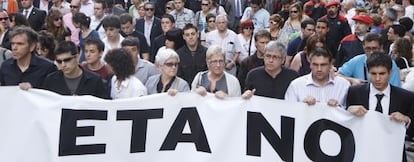Closure of Basque association marks end of anti-ETA movement
With the terrorist group’s activities seemingly over, civic groups say their job is done


The last remaining Basque association created to help bring ETA to an end will cease to exist in March, in acknowledgment that the terrorist group appears to have ended its violent activities for good.
Lokarri was part of a social movement that sprung up in the northern region at the height of ETA’s murderous activities, but which has been slowly disappearing since the Basque separatist group announced a definitive cessation of armed violence in October 2011.
While ETA has yet to turn in its weapons and officially disband, Lokarri leader Paul Ríos said that his association’s main goal, the end of violence, has been achieved.
The evolution of the Basque social movements has been an accurate reflection of the evolution of Basque society in the face of terrorism
Pending issues such as disarmament or the return of ETA prisoners to the fold of society are jobs that fall to political parties and Basque institutions, Ríos said.
Lokarri was created in 2006 to help legalize the “abertzale left,” the name traditionally given to radical left-wing nationalists, and give it a political channel for its aspirations.
Other civic society bodies have been dissolving over the last decade as ETA’s violence has come to a gradual end. In June 2012, the largest of the anti-terrorist movements, Gesto por la Paz, ceased to exist. Before that, in 2008, it was Basta Ya, a prestigious association created after the assassination of a young local councilor in 1997, which decided to stop its activities. Many of Basta Ya’s founders decided to go into politics and created Unión Progreso y Democracia (UPyD).
The evolution of the Basque social movements has been an accurate reflection of the evolution of Basque society in the face of terrorism. When Gesto por la Paz first called a street demonstration on November 26, 1985, ETA had killed 465 people.
“It took us a while to react because we were coming out of a dictatorship and many Basques erroneously justified ETA’s rebelliousness against oppression,” explains Ana Rosa Gómez Moral, a member of this group. “It took us a long time to realize that we were now living in democracy and that there was no possible justification of terrorism.”
José María Calleja, one of the sponsors of Basta Ya, recalls how they were trying to push all Basques who rejected terrorism into civic engagement “with the goal of taking away the fear that permeated our society and take back the streets from ETA and its friends.”
Between 2003 and 2010, ETA’s assassinations were reduced drastically, numbering 11 in that entire time. Since Franco’s death in 1975, ETA has killed more than 800 people.
Tu suscripción se está usando en otro dispositivo
¿Quieres añadir otro usuario a tu suscripción?
Si continúas leyendo en este dispositivo, no se podrá leer en el otro.
FlechaTu suscripción se está usando en otro dispositivo y solo puedes acceder a EL PAÍS desde un dispositivo a la vez.
Si quieres compartir tu cuenta, cambia tu suscripción a la modalidad Premium, así podrás añadir otro usuario. Cada uno accederá con su propia cuenta de email, lo que os permitirá personalizar vuestra experiencia en EL PAÍS.
¿Tienes una suscripción de empresa? Accede aquí para contratar más cuentas.
En el caso de no saber quién está usando tu cuenta, te recomendamos cambiar tu contraseña aquí.
Si decides continuar compartiendo tu cuenta, este mensaje se mostrará en tu dispositivo y en el de la otra persona que está usando tu cuenta de forma indefinida, afectando a tu experiencia de lectura. Puedes consultar aquí los términos y condiciones de la suscripción digital.








































